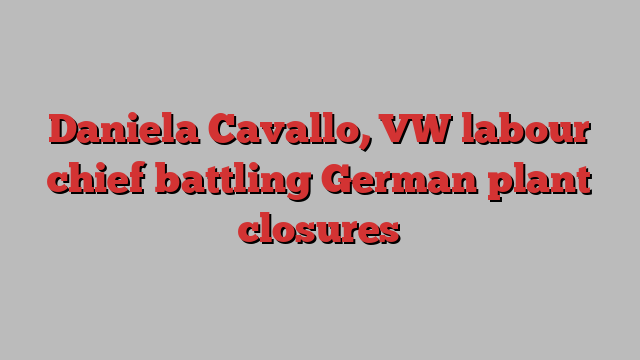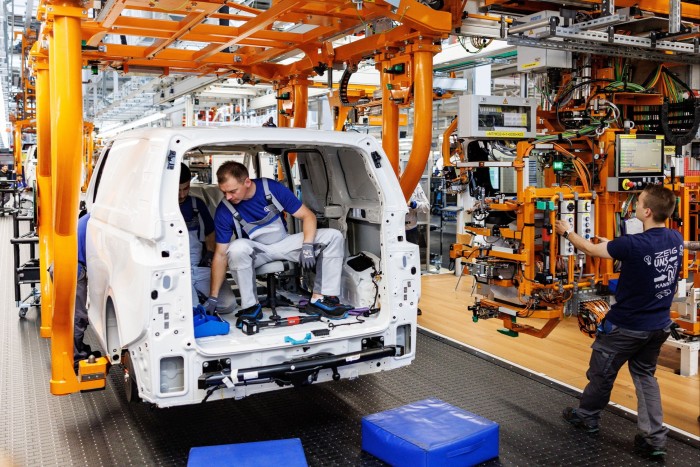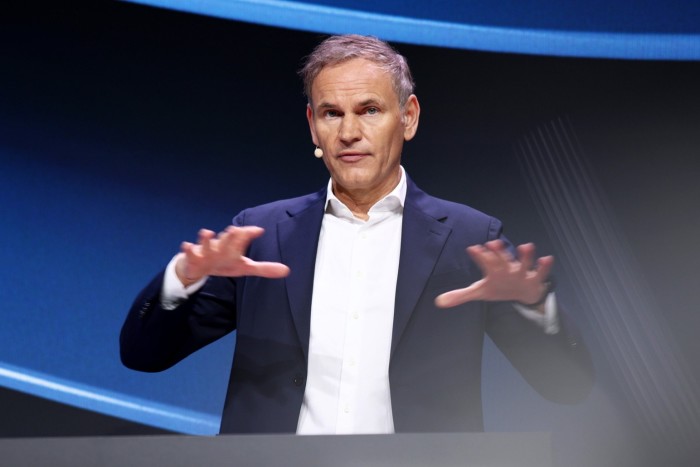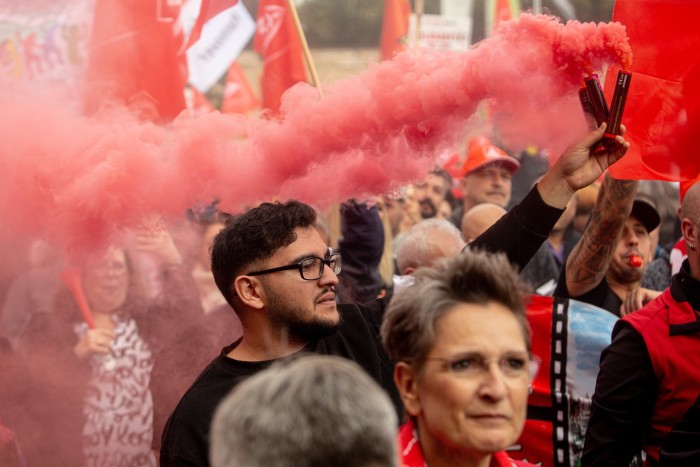
It is rare for a German industry figure to evoke the Nazi era but VW labour chief Daniela Cavallo is dealing with a crisis of historic proportions.
The 49-year-old chair of VW’s powerful works council, which commands half the 20 seats on the carmaker’s supervisory board, reminded staff in September that VW’s creation in 1937 was made possible with funds expropriated from unions.
“Volkswagen does not belong to the shareholders alone,” she thundered. “Volkswagen also belongs to us: the workforce.”
Cavallo’s fierce resistance to executives’ plans to close at least three factories and lay off tens of thousands of workers in Germany, something the company has never done before, is more than the challenge of a lifetime for VW’s first female works council boss. In the words of Cavallo, who represents almost 300,000 staff at Germany’s largest industrial employer, “it’s about whether car manufacturing jobs still have a future in this country.”
Cavallo is a product of Germany’s Wirtschaftswunder — the postwar economic miracle of which VW and its globally beloved cars became a symbol. It was a job at VW that in 1969 prompted her father to trade a village in the Italian region of Calabria for Wolfsburg, where Cavallo was born a few years later.

“My father always said that VW is the best employer in the region. If you get an apprenticeship at the factory, you have a secure future,” she said in 2012, when news broke that she was being groomed for the top job on the works council.
Like her two sisters, Cavallo followed in her father’s footsteps. In 1994, she became an office clerk trainee at VW — the same year the group’s current chief executive Oliver Blume was accepted for a trainee position at Audi.
While Blume climbed the corporate ladder, Cavallo rose through the ranks of VW’s parallel power structure with the backing of her mentor Bernd Osterloh, her notoriously combative predecessor who served as works council chair for 16 years until 2021.
Cavallo, who two decades ago became the first member of the male-dominated works council to take parental leave, was long viewed internally as a contrast to Osterloh. She is “a good listener, a strategic listener”, according to one former VW executive.
But as the battle with Blume and his team intensifies, Cavallo’s negotiation style — or at least the perception of it — has shifted. “She’s more confrontational with management [than Osterloh was],” said Helena Wisbert, a professor of automotive economics at Ostfalia University in Wolfsburg, who used to work for VW.

Cavallo declined to comment, with a spokesperson stating she was busy “negotiating, safeguarding thousands of jobs and being available to our workforce”. But the labour leader’s reluctance to talk to the press does not mean she does not know how to use its power.
“She has been very fast with her statements in recent weeks,” said Wisbert, referring to the speed with which she has publicly called out proposals made by VW executives, strategically “using the public and the press”.
To those watching from the sidelines, it is clear the tug of war in VW’s Wolfsburg headquarters has become a critical test of Soziale Marktwirtschaft, Germany’s brand of capitalism that has traditionally prioritised worker welfare alongside corporate profit.
Higher energy costs following Russia’s full-blown invasion of Ukraine, Europe’s sluggish post-pandemic recovery and China’s domestic demand problems coupled with its growing export ambitions have dealt heavy blows to German industry at a time when it is under mounting pressure to decarbonise.
German industrial production is down 16 per cent from its peak in 2017, and the crisis has prompted soul searching in Europe’s largest economy over whether its industrial giants can retain their special relationship with well-paid workers even as margins come under pressure.

Labour leaders such as Cavallo argue that anything else would threaten the cohesion of German society. She told about 25,000 workers who had gathered to listen to her in Wolfsburg last week that VW was planning to “sell out in its home country”.
Cavallo has not denied that falling profit margins at VW’s flagship brand, which stood at 2 per cent in the first nine months of the year, need to be addressed. But she has argued that job cuts will do little to address VW’s main problem — that fewer people want to buy its cars.
Core to her intensifying criticism of executives is the company’s failure to develop an electric vehicle priced below €20,000 — a gap in its line-up that has become glaring as Chinese EV brands start arriving in Europe.
But it is not for lack of trying. A recent plan to co-produce cheap EVs with rival Renault in a bid to split costs was blocked by the works council, as the companies argued it would be too expensive to make the cars in Germany.
“Cavallo has pointed out that VW made the wrong decision not to make small, cheap cars any more,” said Wisbert. “On the other hand, she is responsible for the workforce in Germany, where high labour costs are a problem”.
Some of Cavallo’s opponents expect her promise to preserve all German plants could eventually erode her relationship with workers, who the former VW executive said “know that something needs to change”.
But Anke Jentzsch, a member of VW’s technical development team in Wolfsburg, argues that support for Cavallo will only strengthen as long as executives fail to present a palatable road map for the future.
“If we had a goal and a path to get there, then I don’t see my colleagues having a problem with saying ‘OK, we can tighten our belts to get there’,” said Jentzsch. “But we don’t have a goal.”